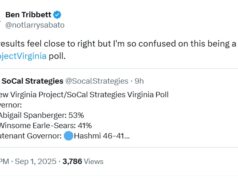This is part 2 to my first post on the steep uphill battle facing Democrats in Southwest Virginia this year. Cross posted at the newest political blog in the Commonwealth, the Real Crystal Ball!
Back in 2005 Republican Anne Crockett-Stark knocked off incumbent Democrat Bennie Keister in the 6th District. Keister had been barely holding onto office in the first place, winning the open seat in 2001 with 51% of the vote and winning reelection in 2003 by just 49 votes. In both races Keister had a significant financial edge over his Republican challengers, so it’s no surprise that when Republicans targeted the race heavily in 2005 and outspent him they pulled off the win.
Let’s take a look at Keister’s performance.
When he won in 2001, he was running behind Mark Warner at the top of the ticket. Warner won the district with 53%, two points ahead of Keister. In 2005, Tim Kaine was winning 45% of the vote, close to the 46% that Keister lost with downticket. Keister was pulling off narrow victories in a district that was shifting from supporting local Virginia Democrats to won that was Republican up and down the line, but it was still competitive for even Tim Kaine in 2005. But even when outspending his Republican opponents almost three to one, Keister never was able to put this district away. Republicans smelled the blood and came after him with a vengeance in 2005.
Democrats contested the seat again in 2007 and lost, but kept it from being a blowout. But in 2008 Obama was blown out of the water here. His 37.5% of the vote was just a hair above Kerry’s 36.8%. This district is hostile to national, liberal Democrat. And all signs pointed to the district getting worse for Democrats.
In 2009, Virginia Democrats saw a district that was trending away from the party with a battle hardened Republican incumbent and wisely decided … to throw more money at it.
Wait, what?
Break it down.
Mark Warner in 2001 won the district with 53% of the vote. Even if Creigh Deeds rebuilt something resembling the Warner coalition from 2001, the change in the district over the years was going to make it unlikely that he would win the district. A strong Democratic challenger might be able to run ahead of the top of the ticket, but they would be going up against an entrenched Republican. That’s assuming Deeds is doing well at the top of the ticket, instead of being shellacked.
I don’t fault the party for trying to find a strong candidate and making sure that the seat was contested. But once the alarm bells were going off in Richmond about the McDonnell tsunami heading their way, they needed to prioritize districts and try to defend incumbents first, not invest in a seat that was always going to be a reach.
In late October, 2009, the Democratic House Caucus put in over $80,000 to Carole Pratt’s campaign. Pratt, a retired dentist, might not have had much going for her in terms of political connections in the district, but she was the mother of the House Caucus Director at the time, Matt Mansell. Matt is now lobbying for the Medical Society of Virginia and I can only thank him for leaving campaign politics to the professionals.
In a year in which several incumbent delegates were dragged down to defeat by Deeds, four stand out for the narrow margins of their defeat: Mathieson, Valentine, Vanderhye and Nichols. Republicans probably would have targeted them for defeat through redistricting, and liberal Democrats like adulterer David Englin would defend that as fair, but I bet most Virginia Democrats would prefer to have had a chance at keeping those four around instead of supporting Pratt, who got blown out with less than 35% of the vote. Pratt was the 6th largest recipient of support from the House Caucus in 2009, behind Bouchard, Mathieson, Werkheiser, Stevens Miller and Nichols. Don’t you think that money could have been better spent?














